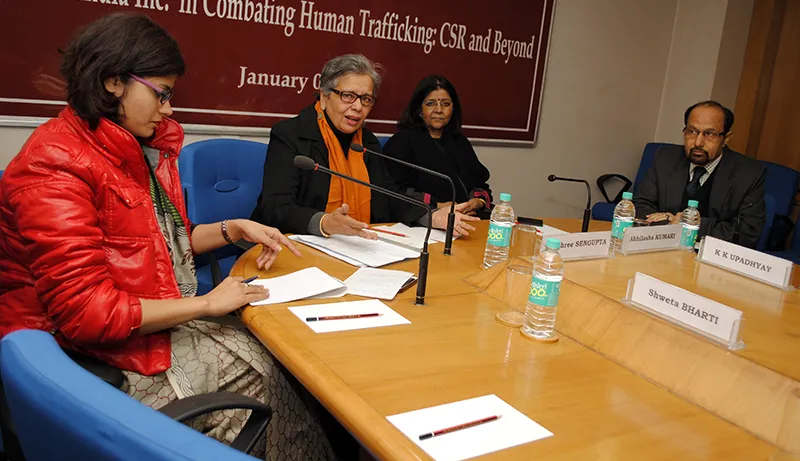-
CENTRES
Progammes & Centres
Location
There is a need for a multi-pronged attack on human trafficking involving the government, corporate bodies and the civil society, it was observed at a panel discussion on the "Role 'India Inc' in Combating Human Trafficking" at ORF.

There is a need for a multi-pronged attack on human trafficking involving the government, corporate bodies and the civil society, it was observed at a panel discussion on the "Role ’India Inc’ in Combating Human Trafficking", organised by Observer Research Foundation.
Dr. Abhilasha Kumari, Executive Director of a renowned NGO, Apne Aap, said while the corporate houses have resources, NGOs have the data and the intent and the government is the biggest service provider. When these three parties will work in tandem, human trafficking is bound to get minimised, Dr Kumari noted at the discussion on 6 January 2014. She said Government has schemes but the right execution of those schemes needs to be done. Dr Kumari said a sustained attack on human trafficking will involve focus on men as well. If men are unemployed they tend to use women’s bodies as a means to earn their livelihood. Additionally, attitudinal changes towards women in general and sexuality in particular must also be sought.
ORF organised the discussion as human trafficking has emerged as a growing global menace in the recent years, especially in the Indian context. The issue was critically examined and the present situations and future prospects were also considered. The event was chaired by Jayshree Sengupta, Senior Fellow, Observer Research Foundation. Sharing vital information with respect to the nature and the extent of human trafficking in the country, Dr Kumari said government has been unable to provide economic security to people and this has been the prime cause of trafficking. She also threw light on the demand and supply dynamics of the multi-billion dollar human trafficking industry.
She said the invisibility of the menace of human trafficking in policy discourses is the biggest hurdle in combating the same. The people who are being trafficked are so grossly marginalized that they are not even visible or listed anywhere. She referred to Prof Amartya Sen’s observation about missing girls and stated that nobody officially knows what has been happening to them. Orissa, Chhattisgarh, West Bengal, Bihar and Andhra Pradesh were listed as high trafficking zones. Dr Kumari said that 80% of trafficking ends up in sexual commercial exploitation.
Dr Kumari said no effective measures were taken by the government to address the issue of human trafficking until the threat of AIDS emerged. Prevention of AIDS initiatives like NACO began to focus on red light areas. However, such initiatives very largely concerned with the client not getting infected rather than the health of the sex worker. Dr Kumari said that a sustained attack on human trafficking will involve focus on men as well. If men are unemployed they tend to use women’s bodies as a means to earn their livelihood. Additionally, attitudinal changes towards women in general and sexuality in particular must also be sought.
Shweta Bharti, a lawyer at Hammurabi and Solomon, brought to the table the legal perspective on human trafficking. She said that at present there are no clearly defined laws in India to curb sex trafficking. This makes it the third largest country of the world riddled with human trafficking. Although sections 370, 374 criminalise trafficking and forced labour, a lot is left to be desired in terms of implementation. In many cases only the petty handlers are caught and punished while the trafficking mafia remains unscathed. There is lack of awareness and sensitization at lower judiciary since training and sensitization initiatives are often engaging the top brass. Bharti also shared information on global best practices and threw light on the legal initiatives taken by countries like the USA to curb human trafficking.
Dr K.K. Upadhyay, head of the CSR vertical at FICCI, talked about corporate social responsibility (CSR). Drawing upon his experiences in the field of development in past and the current involvement with the corporate world at present, Dr Upadhyay gave a comprehensive view of CSR. He began by listing the reasons for the corporate houses to involve themselves with community development initiatives. Firstly, CSR becomes a big branding exercise for the corporate houses and establishes their credibility. Secondly, by undertaking initiatives in the field of education near the factory locations a steady flow of employable personnel is ensured in the otherwise backward regions. Thirdly, commitment and soft corner of the owners towards certain social issues also often results in CSR initiatives in those fields. With the latest amendment in the Companies Law act, CSR has been mandated for the big corporate houses. While there is reluctance to comply by the mandate, there is no getting away from the same.
Dr Upadhyay shared anecdotal evidence to show that the companies which take CSR seriously and are involved in the process of community development through various initiatives often have smoother sailing operations than the ones that do not. Sometimes, particularly in the case of foreign companies, CSR initiatives are launched even before the operations start. He noted that since the CSR initiatives often come from the top management and owners, efforts must be made to raise their awareness about the menace of human trafficking.
Nishtha Gautam, Associate Fellow, ORF spoke brought the legal, corporate and social strands of the discussion together. She threw light on the fact that displacement of population due to land acquisition for industrialisation has close links with human trafficking. Therefore, it is high time that the ’India Inc’ takes note of the situation and commits itself to rout the menace of trafficking. A passionate discussion followed the presentations and many suggestions came up to improve the situation.
(This report was prepared by Nishtha Gautam, Associate Fellow, Observer Research Foundation, Delhi)
The views expressed above belong to the author(s). ORF research and analyses now available on Telegram! Click here to access our curated content — blogs, longforms and interviews.